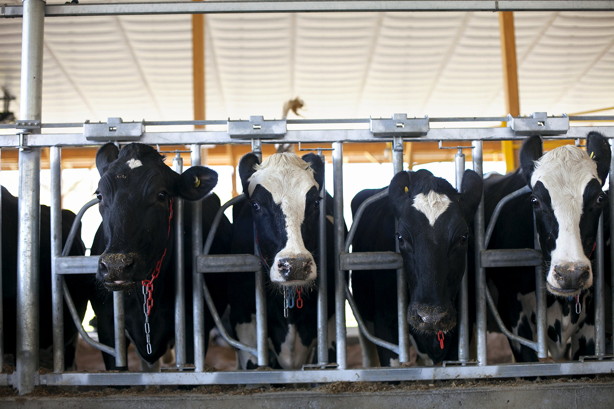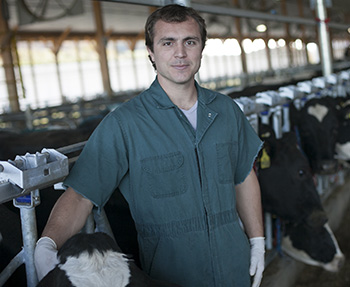FACULTY

Cows at Cornell's dairy research facility in Harford, N.Y., help assistant professor Julio Giordano harness technology for the dairy industry.
Smart farmers, happy cows
Julio Giordano, assistant professor of dairy management at Cornell's College of Agriculture and Life Sciences, began a new study this year. He plans, with the help of three graduate students, to attach high-tech collars to 800 cows on a commercial farm in Aurora, N.Y.
Each collar contains, among other tools, an accelerometer.
"We all have one in here," Giordano said, picking his iPhone up during a recent interview in his Morrison Hall office and turning the phone this way and that.
In a smartphone, the accelerometer is the device that knows which way and at what angle the phone is being held. In a cow's collar, the accelerometer will tell the dairy farmer when the cow is becoming restless and moving more, a sign that she is in heat and ready to breed.
There is also a microphone in each collar that will keep track of the sound of a cow's chewing – or lack of chewing – because the first sign that a cow is getting sick is that she stops eating, says Giordano. The quiet will alert the farmer to care for that cow right away, all the while recording data for future use.
Although this wired cow collar will collect a large amount of information, it will do so noninvasively.

Julio Giordano, assistant professor of dairy management. See larger image
Harnessing technology to make cows healthier and dairies more productive is the goal of the many research projects Giordano has started since he joined Cornell in 2012. His appointment as a Sesquicentennial Faculty Fellow allows him, thanks to a reduced teaching load, to dedicate half his time to exploring uses of technology for health and reproductive management.
Healthy cows make a productive dairy farm – Giordano learned this growing up in Argentina, immersed in the dairy business.
"I've always had this inexplicable passion for dairy cows," he says. Two of his grandparents were dairy farmers, and his father is a large animal veterinarian. Giordano started as a veterinarian, earning his D.V.M. in Argentina, but began to pursue research on the recommendation of a professor.
For his Ph.D. research at the University of Wisconsin, Madison, he created a computerized model of a dairy farm: "This is the herd today; this is what will happen in three years," he says, walking through one simulation. This model, now a tool on the Web, allows working dairy farms to create scenarios and make informed decisions before a single cow is affected.
"I truly think that technology will change the dairy industry," he says. "There is not an end to it."
Giordano is "very vibrant and very energetic," says David Galton, Giordano's predecessor in the dairy management program. Now retired, Galton says the Sesquicentennial Faculty Fellowships program allowed him to work alongside Giordano during the 2012-13 academic year.
"It is an encouragement for faculty to retire knowing there are young, vibrant professors who can bring new, up-to-date ideas to the research world," Galton says.
Last January, Galton and Giordano traveled to Florida together to visit Ronald St. John '68, who endowed Giordano's position. St. John, with his wife and daughter, manages Alliance Dairies in Florida and Georgia, an operation that has 180,000 cows.
"We both went to thank the family," Giordano says. The grazing dairies in Florida reminded him of the dairies in his native Argentina, where it is also warm enough to allow cows to roam grassy fields, even in winter. He reviewed data on the dairy's computers and had some "tremendous" conversations about practices that maximize dairy productivity by keeping the health of the cows as the top priority.
The St. John family's passion for their dairy cows, Giordano says, matches his own passion for research.
"You cannot be successful if you don't have healthy cows," he says. "Those cows couldn't be happier."
Kate Klein is a program assistant for Alumni Affairs and Development.